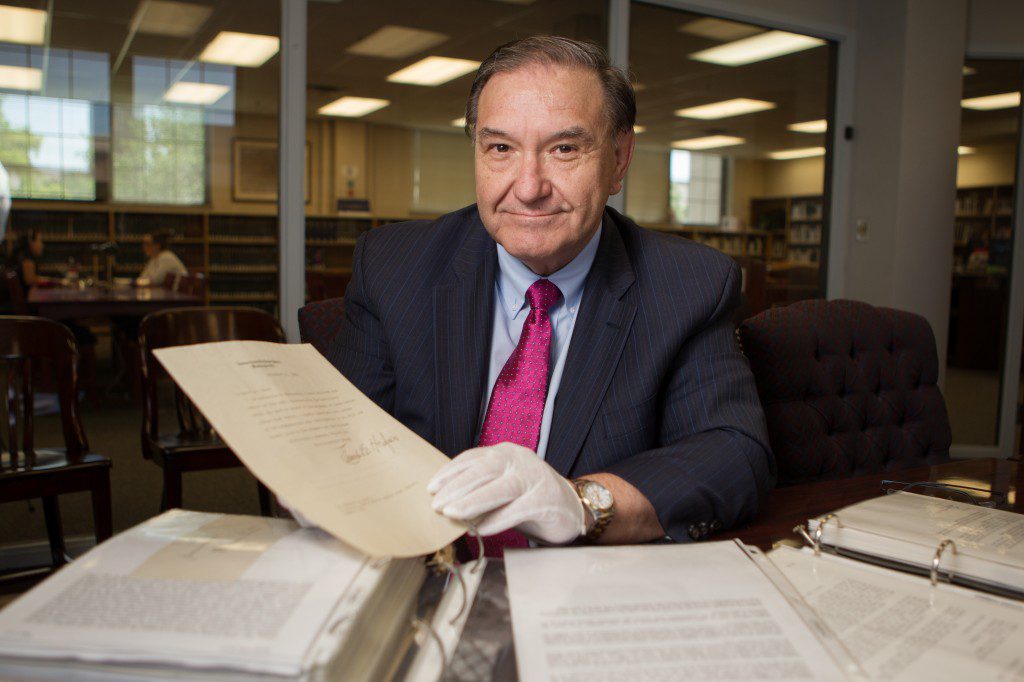Bob Burke’s law office is like a museum. The Oklahoma City attorney with a long history of battling for worker’s compensation reform and enforcement began collecting historical items when he was a boy, and his love of signed items grew into collections now housed in several universities.
On Burke’s office walls are “samples of my world-class Greek and Roman coin collection and Oklahoma fossils,” he says. They include 300-million-year-old brachiopods, arrowheads, a piece of the ruins of Pompeii, ash from Mount Vesuvius and a sliver of marble from the Coliseum.
However, Burke’s largest collection is made of autographs and signed documents from U.S. Supreme Court justices.
“Since the U.S. Supreme Court is the highest court in the land and the last word on appeals, its members have great significance to me as a lawyer,” Burke says.
This collection, which is on exhibit at Oklahoma City University, is the largest known collection of Supreme Court justice writings and signatures. A favorite piece in the collection is a hand-written lawsuit document filed by Justice Thurgood Marshall, who represented Ada Lois Sipuel Fisher of Chickasha in 1947 before his appointment to the court. Marshall’s lawsuit made it possible for Fisher, a black woman, to enter the University of
Oklahoma College of Law, which, Burke says, “opened higher education to minorities in the nation.”
His collecting has humble origins.
“My dad collected old gasoline station signs, so perhaps that is where I got my love for collecting,” Burke says. “Collecting gives you a reason for visiting old bookstores and antique parlors at any town in the world you visit.”[pullquote]“Collecting gives you a reason for visiting old bookstores and antique parlors at any town in the world you visit.”[/pullquote]
When young, Burke began collecting Bibles, rocks, stamps, old books, coins and baseball cards, but it was the 1964 presidential campaign and an autographed photo of Arizona U.S. Sen. Barry Goldwater that hooked Burke.
“That ignited the fire. I subscribed to a monthly service, which gave me home addresses of famous people. I consistently, since 1964, have written to about 20 famous people per month,” he says.
Burke has continued collecting by writing to people all over the world and asking for autographs when he meets famous people.

“Every two years, I write a letter to the president or prime minister of every country in the world. Over the past 30 years, I have received signed photos of nearly 500 leaders – kings, queens, presidents, prime ministers – from more than 200 countries,” he says.
At 65, Burke has begun giving away many of his collections. The University of Oklahoma holds three: the largest privately owned Bible collection, signatures and writings from American presidents and vice presidents and autographs from 300 western movie and TV stars, including Gene Autry, Hopalong Cassidy and John Wayne.
Several universities have displayed Burke’s collections, and he regularly donates documents for charity auctions and nonprofit events. Through his philanthropy, many educational institutions and social organizations have benefited. Yet, there has always been a gratifying side to collecting for Burke.
His most recent autograph came from Petula Clark, whose radio hit “Downtown” was Burke’s favorite song when he was a disc jockey at the radio station KOMA in college.
“I wrote her and told her how much I liked her song and how pretty I thought she was in the 1960s,” he says. “I also told her I should have written her back then, since we were both single. She sent me a wonderful photo, now on my wall with a 45 RPM record of ‘Downtown.’ On the photo, she writes, ‘To Bob, love, Petula Clark. P.S. Better late than never.’”






















